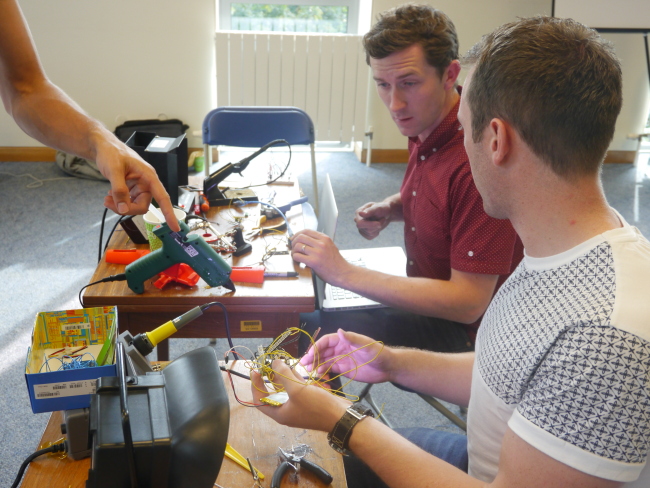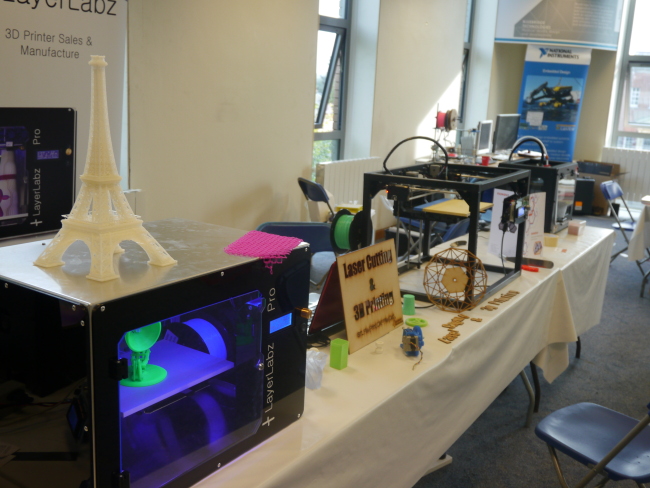The winning Pharmalytics team at this weekend's Hardware Hackathon
Companies looking to succeed in hardware in Ireland have the same shots as those in Silicon Valley or elsewhere, said Liam Casey of PCH International and Intel’s Philip Moynagh at Dublin’s Hardware Hackathon.
Casey, whose company has orchestrated the manufacturing and delivery of iconic products for Apple and Beats, to name a few, after admittedly “fighting on the back streets and alleys of Hong Kong” said that the time is right for entrepreneurs, designers and creators to take advantage of the new opportunities in hardware.
“There is a hardware and prototyping renaissance taking place, not a manufacturing on but we’re working on that.
“You have the same opportunity here as any company in Silicon Valley.”
At the Hardware Hackathon at Dublin City University (DCU)’s Innovation Campus in this past weekend, 120 people arrived on Friday as strangers and finished last night as a dozen or so teams who collaborated on an idea and completed it as a working prototype/MVP.
Among the prototypes developed at the weekend were an intelligent visor system, a connected way-finding helmet, a room temperature optimization system, a sensored safety helmet, smart vending machines, a radar collision prevention system for cyclists, a tracking device for valuable objects, wearable devices for livestock to help in their management and smart sensors for fire safety.
First prize went to Pharmalytics, who developed and prototyped a connected pharmacy fridge with sensors to monitor temperature and medicines in the fridge. The device sends alerts to pharmacies ensuring medicines are kept at correct temperatures and do not have to be checked manually. The team was awarded a €1,500 fund for the continuing development of the product, sponsored by AIB and an individually tailored “Start Your Own Business” course, sponsored by Dublin City Local Enterprise Board. In addition, the winning team will receive a number of electronic engineering consultations with PCH’s award winning in-house team and a variety of equipment to assist in bringing the product to market.
Second prize was awarded to Homebox who created a smart package delivery box that allows delivery companies to securely delivery a package when nobody is at home. The team received a €1,000 fund and will also benefit from a “Start Your Own Business” course among other prizes.
Third prize was awarded to Eco-pulse who developed a product for monitoring water quality in residential areas not connected to main water sources. The team received €500.
The hardware renaissance
Hardware creators in action at the Hardware Hackathon yesterday at the DCU Innovation Centre
The teams of enthusiasts got more than they bargained for at the end of the weekend as Casey along with Intel’s senior vice president for the Internet of Things Philip Moynagh, Drop’s Ben Harris and Rob Merriman from Frontline Ventures gave a master class in the realities of bringing hardware products to market.
The ultimate reality is that despite how easy it may sound, especially with the advent of 3D printers and other new technologies, bringing a hardware product to market is a brutal and expensive business.
“The first thing I look for is the team,” Casey explained when it comes to working with hardware start-ups like Pebble and Drop. “We try to bring down the barriers for people with an idea for products.”
He pointed to Harris’s start-up Drop which has created a wireless kitchen scales technology that interacts with iPad devices to create an interactive cooking experience. Drop’s first product is only weeks away from being launched in stores worldwide.
“Hardware hackathons are the same every where else. Today thanks to devices like Galileo, Arduino and Raspberry Pi and Linux software you can create anything. The energy – it’s amazing what’s possible – when you see people create the prototypes and the buzz around that.
“I’m excited that DCU is bringing Techshop here and that will create a great opportunity for more people to get involved.”
Intel’s Philip Moynagh pointed out that some US$5bn was invested by Intel in Ireland the last three years.
“We’ve conquered cloud, PC, tablets and phones and now we are focused on this new category Internet of Things. The silicon and software stack that feeds the Internet of Things is entirely out of Ireland. Smart Irish people made much of this possible and it couldn’t have happened without that baseline of manufacturing.”
In an amusing anecdote, Moynagh revealed an interesting bit of piracy by the Intel Ireland design team behind the Quark chip and Galileo dev board. While in tech terms a quark is an elementary particle, the team named the Quark chip for the Internet of Things after the line in James Joyce’s Finnegan’s Wake: “Three quarks for Muster Mark!”
He admitted the team only revealed the real truth behind the naming of the chip after the product began to ship.
Drop’s Ben Harris, who invented his first egg boiler at age 12, advised start-ups or entrepreneur in the hardware space that one idea is just not good enough.
“Our first product is an iPad connected kitchen scale and we focused on making it as intuitive as possible. Design was important. Liam Casey agreed to give us 20 minutes of his time and when we showed him that it wasn’t just one product but an ecosystem he stayed with us for 12 hours and we joined his Highway 1 incubator.
“My advice to hardware start-ups is jump in with two feet and believe in your idea. Make sure people understand that you have a long-term vision. We’re taking over the kitchen from start to finish.”
Frontline Ventures’ Rob Merriman backed up Harris’s assertion about the ecosystem. “We only pay attention to people who are thinking three or four steps beyond the original idea.”
Casey said that the key skill required is the ability to sell and articulate the story behind your idea, a major advantage you would think for storytellers like the Irish. But the reality is about far more than pretty words.
“The emphasis at Highway 1 is pitch and the ability to sell. Be careful with the sales channel. There is a huge working capital requirement and the key is to convince investors to invest.”
He urged Irish universities to work on empowering graduates with greater selling skills and said that a letter ‘A’ for Arts is increasingly being added to the STEM grouping. Say hello to STEAM!
Moynagh chimed in: “One of the best ideas I saw this weekend was around a device for water treatment and I was sold because it was sold as a cool story.
“We have more Nobel Prize laureates per capita in this country than anywhere else probably because we talk a lot of s***e. But it’s about bringing it on, telling the story and that’s the attitude you need to bring to your business.”
Casey concluded: “It’s going to take time but things are moving quickly in this space.
“It’s about identifying where the opportunities are. You will see more companies coming out of Ireland in this space.”

